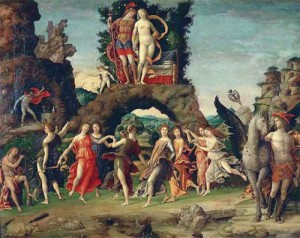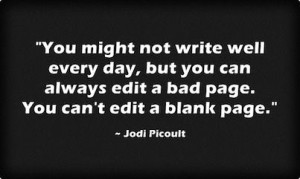So often I hear writers referring to their ‘muse’. Frequently the term is used in a less than positive way:
“My muse isn’t talking to me today.”
“My muse has deserted me.”
“My muse doesn’t like me.”
Even when the muse is present, we portray it as a driving force or as if it was sitting on our shoulder while the true believers hold that the muse is their inspiration and the source of all their creativity.
Okay, so what is the muse? Most of the people who use the term don’t seem to know its origin, so let’s take a short trip through Classics 101.

The idea of the muse has been around since at least 800 BCE. The origins are shady, as with so many of the ancient Greek myths and legends. At times there have been three Muses and several different origin stories, but the accepted tale lists nine ethereal women. It appears that Big Daddy Zeus, who never seemed able to keep his dick in his chiton, bewildered the young Mnemosyne (dubious consent warning) and bedded her on nine consecutive nights. The resulting issue were the nine Muses: Clio, Euterpe, Thalia, Melpomeni, Terpsichore, Erato, Polymnia. Ourania and Calliope.
The shock of bearing and delivering nine daughters in nine consecutive labours was probably too much for this single mother and so she handed the whole brood over to the God Apollo and the nymph Eufime. Apollo, being a creative kind of guy, taught the girls everything he knew and so they all grew up to be artists of one kind or another.
Stepbrother Apollo (yes, their new dad was Zeus’s son too) took them to live in one of dad’s old temples on the beautiful Mount Elikonas. The girls were way too aesthetic to be bothered with everyday human life so they set about encouraging art, philosophy, creativity and imagination.
We probably need to blame Homer for distilling the nine ladies into one entity. At the start of The Odyssey, he invokes the Muse with a prayer which begins, “Oh Divine Poesy, goddess daughter of Zeus, sustain me for this song of the various-minded man.” He did the same in the Iliad.
The tone was further set by Plato, who was certain that sane men had no place in the halls of art. He described “possession by the Muses” as if it were “a kind of madness”.
So to summarise, the muse is not one entity but nine, biologically impossible and the victims of a very narrow minded education. Oh yes, they are a myth. Not fact, not historical, not even a religious belief, just a fairytale.
Why on earth then, would we hand over the control and responsibility for our creativity to such an entity? Well, it wasn’t just the ancients who supported this fantasy. Some modern-day authors not only cling to their belief in this strange creature but they actually begin their writing day with the prayer of invocation to the Muse. The American author Steven Pressfield uses the prayer and in his book ‘The War of Art’ where he appears to believe that this has fuelled a large portion of his success. He states:
“This is the other secret that real artists know and wannabe writers don’t. When we sit down each day and do our work, power concentrates around us. The Muse takes note of our dedication. She approves. We have earned favour in her sight. When we sit down and work, we become like a magnetised rod that attracts iron filings. Insights accrete.”
Even Ray Bradbury has said that,
“I’m not in control of my Muse. My Muse does all the work.”
Of course there are many successful writers who take the opposite viewpoint. Prolific writer Jodie Picoult has stated that,
“Writing is total grunt work. A lot of people think it’s all about sitting and waiting for the muse. I don’t buy that. It’s a job. There are days when I really want to write, days when I don’t. Every day I sit down and write.”
Few contemporary writers are more successful than Stephen King. In his outstanding book ‘On Writing’ he says:
“Don’t wait for the Muse…… This isn’t the Ouija board or the spirit world we are talking about here, but just any other job like laying pipes or driving long haul trucks.”
Okay gentle readers, those who know me will know that the scientist in me looks for evidence-based options. In the absence of these I will take a moderate and open-minded route. For over two hundred years, scientists have researched the creative process of the human brain. The rise of neuroscience has in the last twenty-five years or so begun to tease out the evidence, but as yet it cannot be described as definitive. We are a long way off from a flow diagram for the creative process needed to write a bestselling novel.
If anything, neuroscience has shown us that the brain’s ability to create anything is almost at the level of a miracle. For me, it’s not the structure or mechanics of the brain which inspire me so much as its ability to self-organise. With a quadrillion synapses firing between a trillion neurons it ought to be complete chaos, but it isn’t. Have you ever seen those remarkable shots of hundreds of thousands of starlings in flight as part of a murmuration? Instead of potential chaos there is in fact order and beauty, but the birds answer to no Muse.
So what is the process? Can we be creative without some fairy-tale driving us on? I would not dismiss the muse out of hand and if she works for you then by all means counter among your friends. For me however, there is a more rational but no less awesome alternative.
Our brains are the most incredible archives ever, with the ability to store, organise and create links between its files. A writer takes all the images stored there, the events, people and words, and then allows the brain to make a whole set of new connections where none existed before. For me it is almost an insult to lay the responsibility for the brain’s remarkable abilities at the door of some mythical nonentity.
Maybe we just need a new definition for our Muse. At the end of the day, does it matter what label you give it so long as it works for you?
So what’s my point here, you may ask? Whatever we believe our creative process to be, it can only work if we engage with it. To be a creative writer we need to write. Again, in ‘On Writing’ Stephen King also wrote,
“Your job is to make sure that the Muse knows where you’re going to be……. If he does know, I assure you that sooner or later he will start showing up.”
So, my muse is an amazing combination of all the things which make me who I am. If my brain does not have the right stuff in it there will be nothing to be creative with.
 Live life. Don’t let it just happen to you.
Live life. Don’t let it just happen to you.
Collect experiences and absorb them.
Stroll through your mind and make those connections.
Then write, write, write.
T J Masters is a writer living in Hertfordshire, England and publishing through Dreamspinner Press. Watch out for the new novel Bear Among the Books coming soon.


I enjoyed the article very much. Whether the Muse is internal or external or a small fantasy that charms you, the real point that was made that whatever encourages you, forces you or makes it possible for you to write, is unimportant as long as you do write. Thank you T.J. Masters.